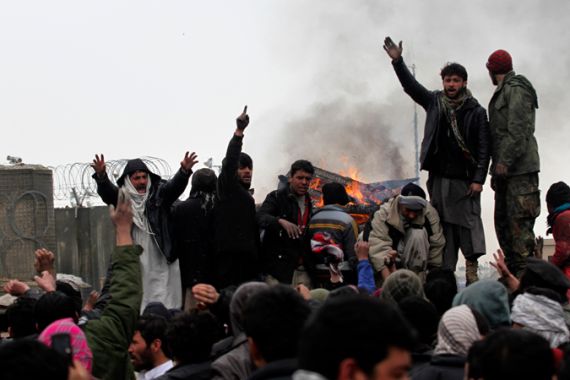No charges in Afghanistan Quran burning
US soldiers and marines receive administrative punishment but no criminal charges for incident that led to protests.

Six US army soldiers and three marines have escaped criminal charges for burning copies of the Quran and urinating on the corpses of Taliban fighters in Afghanistan, but have received administrative punishments, according to US military officials.
A military investigation concluded on Monday that miscommunications, poor guidance and soldiers’ decisions to take “the easy way instead of the right way” resulted in the burning of Quran copies and other religious books at a US base in Afghanistan early this year.
US military leaders widely condemned both the Quran burning and the urination, which was captured on video.
The Quran burning triggered Afghan riots and retribution killings, including two US troops who were shot by an Afghan soldier and two US military advisers who were killed at their desks at the interior ministry.
The exact punishments were not disclosed on Monday, and it was not clear whether the lack of criminal charges would trigger any protests in Afghanistan.
Administrative punishments could include demotions, extra duty, forfeiture of pay or a letter in their file. They also could stall future advancement and end military careers.
Afghan response awaited
Aimal Faizi, a spokesman for Afghanistan’s president, said Hamid Karzai’s office would review the decisions and wait until Tuesday to respond.
The news on the punishments came late at night in Afghanistan.
Afghan officials have claimed the Quran burning was intentional, and the incident reinforced perceptions in the country that Americans are insensitive to the Afghans’ religion and culture.
Discipline against a Navy sailor in the Quran burning was dismissed. The navy said the sailor was found not guilty of any alleged misconduct. The Marine Corps said it will announce discipline against additional marines in the urination case at a later date.
The investigation report provided new details about the missteps that led to the burning of about 315 religious books and Quran copies, which had been taken from the detention facility in Parwan.
Officials believed that extremists being detained there were using the texts to exchange messages. The religious books and other materials were put in burn bags and were taken to a fire pit used to burn garbage at Bagram Air Field, a major US base north of Kabul.
More than 2,000 books, including about 1,200 religious texts and Quran copies, were targeted for disposal, but most were saved when an angry crowd of Afghans interceded.
Troops estimated that about 100 religious books were destroyed. Others were recovered, but many were damaged.
Officials have said repeatedly the Quran burning was not intentional and a mistake.
Not intentional
The report released on Monday found that service members “mishandled” Quran copies and other religious material and put them in an incinerator.
It concluded that there was no “malicious intent to disrespect the Quran or defame the faith of Islam.”
Instead, it said the burning disaster resulted from miscommunications, ignorance about the handling of Quran copies and the failure to provide clear guidance.
The urination video, which came to light in January and appeared on YouTube, showed four marines in full combat gear urinating on the bodies of three dead Taliban fighters. On Monday, the Marine Corps revealed that there also were photographs taken at the time.
Urination incident
The Marine Corps, in a release on Monday, said one marine pleaded guilty to urinating on the Taliban soldiers and posing for a photograph.
Another marine pleaded guilty to wrongfully videotaping the incident and posing for a photograph, and a third pleaded guilty to failing to report the mistreatment of human casualties and lying about it.
The actions depicted in the YouTube video took place during a counterinsurgency operation in the Musa Qala district of Helmand province, in southwestern Afghanistan in July 2011.
Four marines from a sniper unit in the 3rd Battalion, 2nd Marines based at Camp Lejeune in North Carolina, were questioned over the scandal in January, when the images emerged.
The unit was deployed in Helmand from March to September last year.